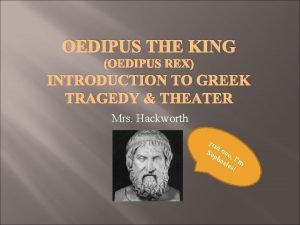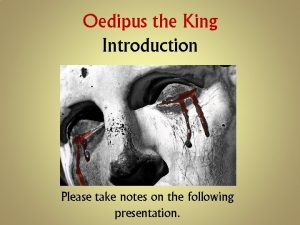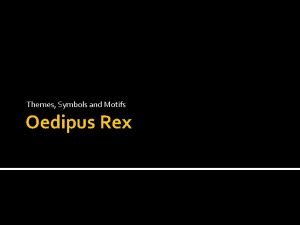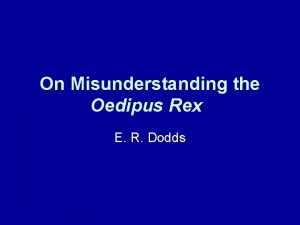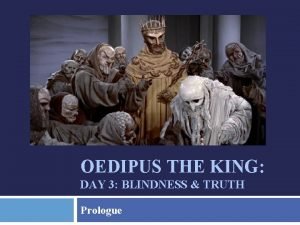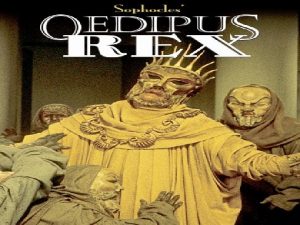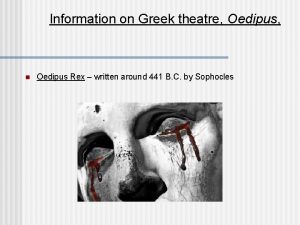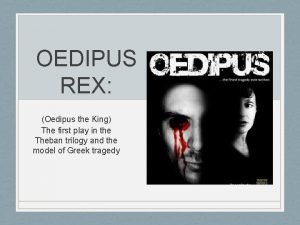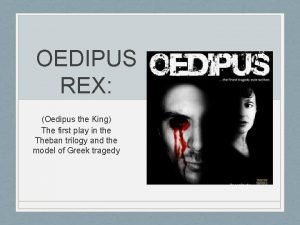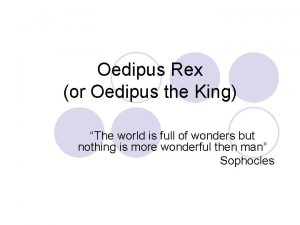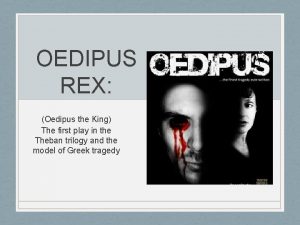OEDIPUS THE KING OEDIPUS REX INTRODUCTION TO GREEK









- Slides: 9

OEDIPUS THE KING (OEDIPUS REX) INTRODUCTION TO GREEK TRAGEDY & THEATER Mrs. Hackworth γει ά So σου ph , I’ oc les m !

The Tragic Vision: Affirmation Through Loss Tragedy is drama in which a major character undergoes a loss but also achieves illumination or a new perspective. It is considered the most elevated literary form because it concentrates affirmatively on the religious and cosmic implications of its major characters misfortunes. In ancient Greece, it originated as a key element in Athenian religious festivals during the decades before Athens become a major military, economic, and cultural power during the fifth century B. C. E.

Elements of Tragedy Three Unities Unity of action- play has one main action it follows Unity of time- play takes place within 24 hours Unity of place- play takes place within one physical space Terms Crisis of feeling - painful or harmful experience that may upset or depress the audience. Catharsis - the audience cleanses their emotions. For example, they may feel uplifted. Reversal - the hero/heroine goes through a significant change in fortune for the worse. Reversal may happen after a discovery of something previously unknown to the hero/heroine.

Worship of Dionysus Originally, tragedy in Athens was associated with the worship of Dionysus—one of the twelve principal gods who, it was thought, transformed human personality, freed people from care and grief, ensured their fertility, and provided them with joy. God of Wine

Irony in Tragedy Implicit in the excessiveness of tragic suffering is the idea that the universe is mysterious and often unfair and that unseen but powerful sources—fate, fortune, circumstances, and the gods—directly intervene in human life. Ancient Athenian belief was that the gods give rewards or punishments to suit their own purposes, which mortals cannot bring about, prevent, or understand.

Sophocles Sophocles was born about 496 BC in Colonus Hippius (now part of Athens), he was to become one of the great playwrights of the golden age. The son of a wealthy merchant, he would enjoy all the comforts of a thriving Greek empire. Greek playwright and poet Sophocles is said to have written over 100 plays, of which seven survive, including: Ajax (c. 450 BC), Antigone (c. 442 BC), Oedipus Rex (? c. 425 BC) and Electra (409 BC).

Sophocles (continued) When Oedipus the King was first performed between 430 and 425 BCE, most of the audience would have known the general outlines of the story inasmuch as it was one of the “received legends” of tragedy.

Greek Tragedy & Theater https: //www. youtube. com/watch? v=d. Sr 6 m. Pzx. Uc https: //www. youtube. com/watch? v=a. SRLK 7 So gv. E https: //www. youtube. com/watch? v=RKdb. Lia. Gv. U

The Family Tree
 Oedipus rex introduction
Oedipus rex introduction Please take notes
Please take notes Motifs in oedipus the king
Motifs in oedipus the king How does oedipus react to the corinthian messenger’s news
How does oedipus react to the corinthian messenger’s news On misunderstanding the oedipus rex
On misunderstanding the oedipus rex Theme of sight and blindness in oedipus rex
Theme of sight and blindness in oedipus rex Oedipus the king part 1 study guide
Oedipus the king part 1 study guide Oedipus the king themes
Oedipus the king themes Author of oedipus
Author of oedipus Dramatic structure of oedipus rex
Dramatic structure of oedipus rex
